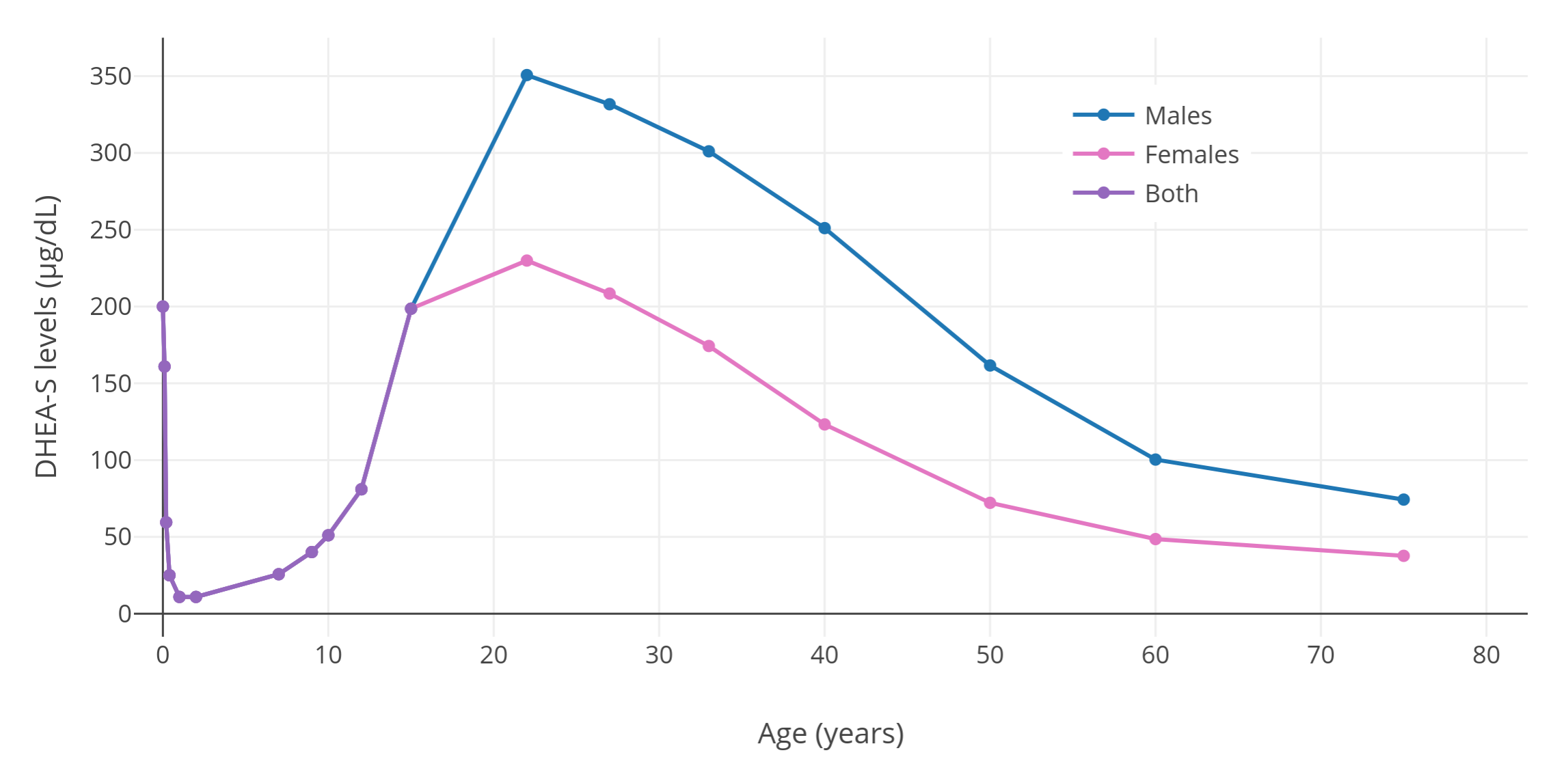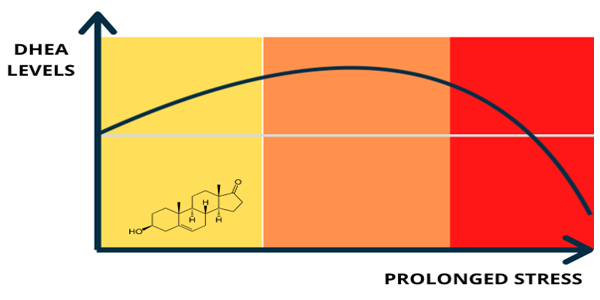
DHEA is perhaps the hormone that people know the least about. It is a tremendously important Adrenal hormone that has a host of powerful benefits that you do not want to be without.
DHEA is produced mostly by the Adrenal glands and a very small quantity from either the Ovaries in women or Testes in men. The precise quantity and balance of this hormone is essential for energy, immunity, controlling sugar, fat metabolism, stress, mood and longevity.
Deficiency in DHEA leads to disease, dysfunction, and aging.

Overview
Like all other hormones made by the body, DHEA is synthesized from the precursor Cholesterol. DHEA is referred to as a precursor hormone because it is the starting hormone from which other hormones are produced, including estrogen and testosterone. It has been found to decline progressively with age. The production of DHEA by the body peaks at about age 25 and then steadily declines to about 50% of peak levels at age 40, and less than 10% at age 65. This age-related decline does not occur with any of the other adrenal steroid hormones. In animal studies, supplementing DHEA extended the life span by as much as 50%.
DHEA was discovered in 1934, but it did not obtain significant interest until 1994, when researchers at the University of California, San Diego, School of Medicine, found that DHEA given to middle-aged volunteers increased their physical and psychological well-being. While taking DHEA, the volunteers in this study experienced enhanced energy, deeper sleep, improved mood, more relaxed feelings, and improved ability to deal with stressful situations.
Since this landmark study in 1994, studies of peoples from around the world has shown that individuals with higher DHEA levels live longer and have fewer incidents of heart disease and cancer than individuals with low DHEA levels. This suggests that some of the manifestations of aging may actually be caused by low levels of DHEA.
Both animal and laboratory studies show that DHEA may prevent heart disease, cancer of the breast, colon and liver, obesity, and diabetes, as well as enhance immunity and prolong life. In humans, evidence hints that low levels of DHEA may be associated with Lupus, Rheumatoid Arthritis, Multiple Sclerosis, Chronic Fatigue Syndrome, allergic disorders, Osteoporosis, and Alzheimer’s disease.
In the 1930’s scientists found that the wild yam Dioscorea villosa contained DHEA virtually identical to that produced by the adrenal glands. It can now be produced in the laboratory by extracting diosgenin from the yam. Wild yams grow mainly in central and southern North America and are found in abundance in Mexico. It is a perennial vine that can climb as high as twenty feet. Preparations from the boiled root were first used by American Indians.
The Top Ten Reasons to Take DHEA

1. Adrenals/Stress
DHEA is the counterbalance to Cortisol, which is also made by the Adrenal Glands. Acute stress stimulates the release of Cortisol (Hydrocortisone) to raise your blood sugar to give you immediate energy to flee from danger. Prolonged or elevated Cortisol Levels, however, can cause chronic inflammation, autoimmune diseases and psychological issues such as irritability and depression.
According to The International Journal on the Biology of Stress:
2. Diabetes
If your DHEA level is too low to counter the excess Cortisol it leads to the prolonged production of sugar and excess belly fat. DHEA has been shown to increase insulin sensitivity which would decrease the risk of developing the typical age-related rise in blood sugar that is related to obesity, hypertension, and Maturity Onset Diabetes.
3. Fat Burning
DHEA is the hormone counterbalance to Cortisol. Stress causes excessive Cortisol which leads to elevated blood sugar and abdominal fat storage. DHEA is also the precursor to Testosterone in Men and Women. Both DHEA & Testosterone help you build muscle which is where you burn fat, but both decline with age leading to less muscle and hence decreased ability to burn fat. This is a principal causes of the sudden changes in weight gain as one ages.
4. Cardiovascular Disease
In a study of 242 men aged 50-79, DHEA was shown to be significantly lower in the group who had heart disease than the group with no known history of heart disease. When DHEA was given to the men with low levels, they experienced a 48% decrease in cardiovascular disease and a 36% decrease in death from any cause. Again, DHEA builds Testosterone and both hormones build muscle, including the heart muscle and the cardiac muscle that lines arteries and is essential to the prevention of Cholesterol plaque buildup with age.
5. Cancer Prevention
DHEA has been shown to prevent the formation of breast tumors in a particular strain of mice that is known to have an extremely high propensity to develop breast cancer. It has also been shown to prevent chemically induced cancers of the colon and liver, as well as papillomas of the skin in mice.
In human studies, women with DHEA levels in the highest category were found to be 60% less likely to develop breast cancer than were women in the lowest category. Another study found that DHEA levels were significantly lower in individuals who subsequently developed bladder cancer than in those who did not.
6. Osteoporosis
Women with low DHEA values have been shown to be 40 times more likely to develop osteoporosis than women with normal age adjusted DHEA levels. DHEA is thought to prevent thinning of the bone in two ways. First, it is partially converted to estrogen and also produces a metabolite that binds to estrogen receptors, which like estrogen, prevents bone resorption. Second, it appears that it may directly stimulate calcium absorption and new bone formation.
7. Dementia
In a small, uncontrolled study, the administration of DHEA appeared to produce modest improvements in mental function and improved behavior of male patients with Alzheimer’s disease.
8. Allergies & Autoimmune Diseases
DHEA has been used successfully to reduce the severity of food and chemical allergies. Low levels are common in asthmatics which is often caused by allergies. Autoimmunity occurs when one develops an allergy to his/her own tissues. Multiple sclerosis, for example is an autoimmune reaction in the nervous system. When given in relatively large doses, DHEA has been reported to produce an increase in stamina and an improved sense of well-being in patients with multiple sclerosis. In a clinical trial of women suffering from another autoimmune disorder known as Lupus, 80% reported improvements in overall well-being, less fatigue, more energy and reduction of other symptoms when given 200mg of DHEA per day.
9. Sexual Health
In women, DHEA improves sexual satisfaction, fertility and age-related vaginal atrophy. In men, DHEA is a precursor to Testosterone and an age related decrease appears to be associated with erectile dysfunction (ED), and decreased libido. Some clinical trials of DHEA supplementation in healthy, middle-aged, and elderly men.
10. Longevity & Well-Being
Preliminary studies in animals show that DHEA treated animals look younger, have glossier coats, and less gray hair than control animals. In a recent double-blind crossover study of men and women between the age of 40-70, 67% of the men and 84% of the women noticed a remarkable increase in physical and psycho-logical well-being during DHEA treatment. There was no change in libido and no side effects were seen. DHEA makes your brain less likely to stress out and helps to calm down fear and anxiety!
Safety
Although DHEA is a steroid hormone, it does not have worrisome side effects that are typically associated with taking of anabolic steroids.
Dosage
The recommended dosage varies depending on gender and condition or measured DHEA level in the body. Women typically only require approximately 5-10mg per day and men typically only require 25-50 mg daily.
Women should not take more than 10 mg per day without testing their blood level of DHEA and consulting with a competent health care hormone expert. Men should not take more than 50 mg per day without testing their level or consulting with a competent individual evaluation.
Summary
Measuring and monitoring your DHEA levels will help you live longer and feel your best. The optimal balance of hormones is essential to optimal function, metabolism, and longevity. The typical decline in DHEA with age leads to a specific decrease in estrogen and testosterone. My 35+ years of Clinical experience has shown that aging individuals with low DHEA levels suffer from weakness, muscle wasting, tremulousness, fatigue, depression, declining memory, and other signs of physical and mental deterioration. Treatment with DHEA often results in improved mood, energy, memory, skin color, deeper sleep and improved ability to deal with stressful situations and the ability to maintain a healthy weight and optimal muscle strength and ability to successfully cope with stress.
Dr. Hansen’s Rx:
Make sure you test your DHEA annually and supplement it if it is low, but don’t overdo it. It is important to ensure all of your hormones are balanced. I recommend that you test all 9 Key Hormones every year and that you supplement all that are low. This is the best way to stay young and reduce your risks of rapid aging, stress, heart disease, diabetes, dementia, cancer, osteoporosis and live a more active and fulfilling life.
Research Citations
- Long-term low-dose dehydroepiandrosterone replacement therapy in aging males with partial androgen deficiency.
- Dehydroepiandrosterone (DHEA): hypes and hopes.
- ‘Anti-aging’ hormone found to boost brain-cell growth
- Metabolic Effects of DHEA
- DHEA-S production capacity in relation to perceived prolonged stress
- DHEA and Cognitive Function
- University of Maryland Medical Center Research on Dehydroepiandrosterone
- Hansen Clinic Research DHEA Supplementation in Early and Late Postmenopause

